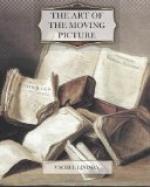The photoplays have done something to reunite the lower-class families. No longer is the fire-escape the only summer resort for big and little folks. Here is more fancy and whim than ever before blessed a hot night. Here, under the wind of an electric fan, they witness everything, from a burial in Westminster to the birthday parade of the ruler of the land of Swat.
The usual saloon equipment to delight the eye is one so-called “leg” picture of a woman, a photograph of a prize-fighter, and some colored portraits of goats to advertise various brands of beer. Many times, no doubt, these boys and young men have found visions of a sordid kind while gazing on the actress, the fighter, or the goats. But what poor material they had in the wardrobes of memory for the trimmings and habiliments of vision, to make this lady into Freya, this prize-fighter into Thor, these goats into the harnessed steeds that drew his chariot! Man’s dreams are rearranged and glorified memories. How could these people reconstruct the torn carpets and tin cans and waste-paper of their lives into mythology? How could memories of Ladies’ Entrance squalor be made into Castles in Granada or Carcassonne? The things they drank to see, and saw but grotesquely, and paid for terribly, now roll before them with no after pain or punishment. The mumbled conversation, the sociability for which they leaned over the tables, they have here in the same manner with far more to talk about. They come, they go home, men and women together, as casually and impulsively as the men alone ever entered a drinking-place, but discoursing now of far-off mountains and star-crossed lovers. As Padraic Colum says in his poem on the herdsman:—
“With thoughts on white
ships
And the King of Spain’s
Daughter.”
This is why the saloon on the right hand and on the left in the slum is apt to move out when the photoplay moves in.
But let us go to the other end of the temperance argument. I beg to be allowed to relate a personal matter. For some time I was a field-worker for the Anti-Saloon League of Illinois, being sent every Sunday to a new region to make the yearly visit on behalf of the league. Such a visitor is apt to speak to one church in a village, and two in the country, on each excursion, being met at the station by some leading farmer-citizen of the section, and driven to these points by him. The talk with this man was worth it all to me.
The agricultural territory of the United States is naturally dry. This is because the cross-roads church is the only communal institution, and the voice of the cross-roads pastor is for teetotalism. The routine of the farm-hand, while by no means ideal in other respects, keeps him from craving drink as intensely as other toilers do. A day’s work in the open air fills his veins at nightfall with an opiate of weariness instead of a high-strung nervousness. The strong men of the community are church elders,




